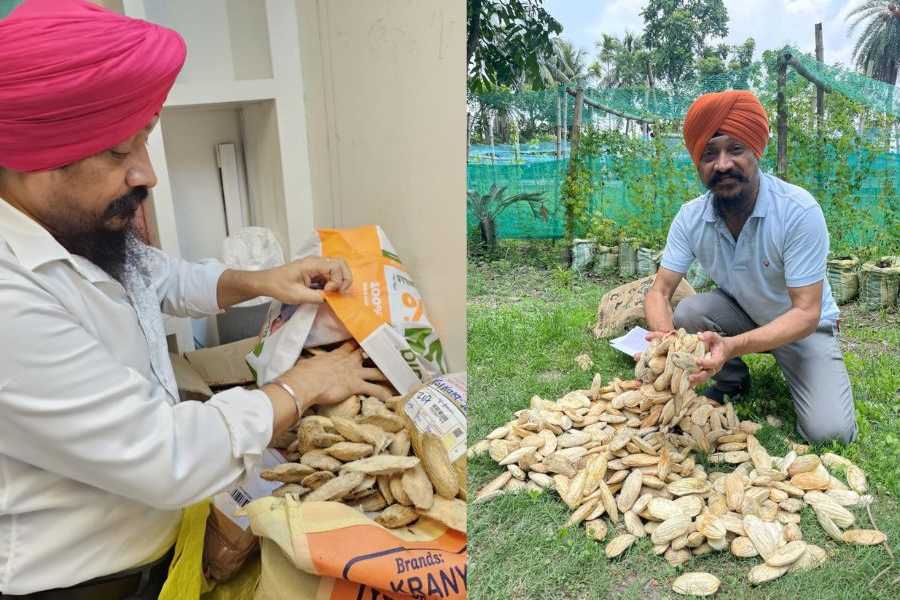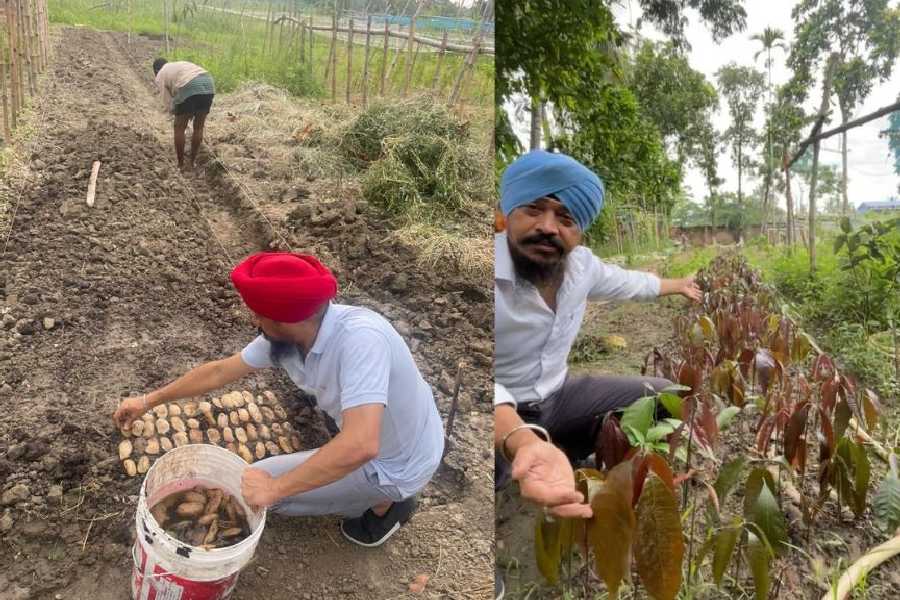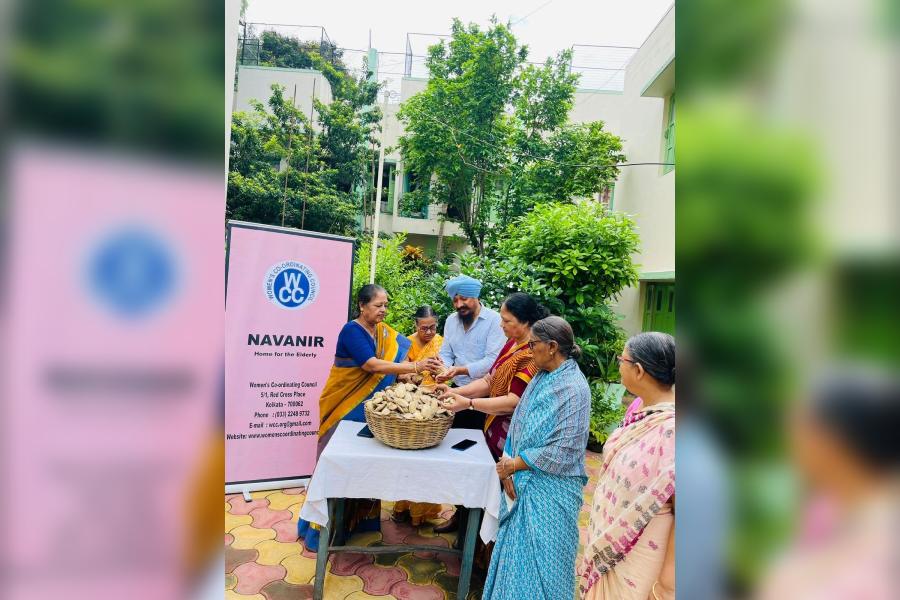If you walk into Jasmit Singh Arora’s Bangur Avenue Block A apartment, a corner of the drawing room on any day of the week will have bulging sacks and cloth bags of various sizes stacked away. These contain dozens of an item you throw away every time you skin and slice a Lyangda, Himsagar or Golapkhas.
The 51-year-old is on a mission to revive mango cultivation. He collects the seeds (aanti) of mangoes and plants them to grow saplings. They are placed beneath a layer of clay and covered with leaves to maintain the optimum temperature, which is three to four degrees below normal. Once they germinate after about six months and reach a height of about three feet, he will graft the saplings with local breeds and will distribute them among marginal farmers.
He has a two-pronged logic for his action. Though India is a mango powerhouse, farmers in Bengal are increasingly shying away from mango cultivation. Bengal is only eighth in the list of mango-producing states. “The reason is a mango tree takes 12-15 years to grow. So they are unwilling to wait out this gestation period. As for existing plantations, most trees are over 50 years old and their germination rate has dropped. If you plant 1,000 seeds, only about 100 grow. So acres of mango orchard are being cleared to make way for other crops, notably paddy,” he says.

Jasmit Singh Arora sifts through a bag of mango seeds at home in Bangur Avenue (left); Jasmit Singh Arora with his collection of mango seeds Left: Sudeshna Banerjee; The Telegraph
But paddy has its own share of problems, he points out. “Paddy requires the highest rainfall. Farmers can earn barely Rs 20,000 per acre by sowing paddy. And if there is enough rainfall in a year to grow two crops, then it doubles to Rs 40,000 per acre. Districts like Purulia and Bankura are notorious for low rainfall. This means farmers put in a lot of chemical fertilisers to maximise growth. This kills earthworms, snakes and other insects at the base of the ecological pyramid. This also impacts farmers’ health as they handle and inhale harmful pesticides. Cancer is on the rise in farmer families as are lung diseases,” said Arora.
Arora wants to share technical knowledge on organic farming with them and turn them into entrepreneurs. “Under Gram Samriddhi Foundation, we are supporting farmers getting into fruit tree plantation,” says the convenor of the Baguiati-based NGO.
He has a plan in place to make farmers take an interest in mango again. “Grafting the sapling with a local breed reduces the gestation period from 12-15 years to three or four years.” The foundation also gives out sajne dnata, lemon, papaya and guava saplings which start giving fruit in a year, while handing out 20 to 30 per cent mango saplings. “That way the farmer has other avenues to earn while the mango trees grow.”
His trips to rural areas for his work with Gram Samriddhi Foundation made Arora aware of the condition of farmers. “I was trying to come up with something which would build a bridge between the city public and the villagers that would create equal opportunities for the latter and allow them to become entrepreneurs while also directly helping the environment.” He stresses on the importance of creating opportunities and wealth for farmers to attract the young generation to stay in the village and take up farming. “Villagers migrating to cities will only add to the joblessness here.”
He has nurtured the idea for about three years now. But it is a video clip carrying his message to seek donation of mango seeds shot by his younger daughter Gunmeet that provided momentum to his efforts. “The video with the Gram Samriddhi Foundation logo that was posted in May went viral and I started getting calls from across India,” he said. Since then, he has collected three lakh seeds.
A motivational speaker, he also started visiting schools, sharing with students his reasons for choosing mango. “Mango trees play a vital role in maintaining ecological diversity. Insects take shelter in mango trees, birds come and promote cross-pollination. The tree provides shade, helps balance oxygen and carbon dioxide in the air and has great medicinal value.”
He also alerts them of India’s low green cover. “We have only 28 trees per person while the global average is 422. While a target of reaching Canada or Russia, at 10,700 trees per person, is too high for us, we can attempt to reach the global average.”
He engages in a dialogue with students and shares this knowledge. So far, schools like Loreto House, La Martiniere for Boys, Shri Shikshayatan, Mahadevi Birla Sishu Vihar, Mahadevi Birla World Academy, DPS Domjur, BD Memorial and Genius Public School have donated seeds collected from students. Several others like South City International, Don Bosco Park Circus, Birla High School, Saifee Hall and Narula Public School, Mogra have pledged support. He is surprised to get no response yet from the Bengali-medium schools he has approached.
“My target for the season is 10 lakh seeds. Next year, I want to collect one crore seeds. My long-term goal is to germinate 10 crore seeds,” he says.
The germination occurs in the foundation’s farm at Amtala in South 24-Parganas. “We have space to grow up to one crore seeds there.”
Hardly do 10 minutes pass in the conversation without his phone ringing. “I have given a war cry, so I must work on a war footing. I get so many calls that I have to charge my phone thrice a day,” he smiles.
He has received over 750 parcels so far full of dry mango seeds, from places as varied as Guwahati, Vrindavan and Kashmir. “Some have as few as 20 while some carry 6,000. Everything is precious.” He points to the contact list on his phone, showing endless names saved with the prefix “mango”. Some have become passionate supporters like a group that drives over every Sunday with the week’s collection from Howrah Maidan. Several aamsattwa manufacturers in Burrabazar have promised to donate one lakh seeds next year.
Eighty per cent of Indian soil, he points out, is fit for mango cultivation. The gift that touched him most was from an old age home, Navanir. “They had got the mangoes as a donation from somewhere and octogenarians washed the seeds carefully and submitted them to the authorities for me.”

LABOUR OF LOVE: Jasmit Singh Arora plants his collected mango seeds and (right) points to the germinated plants. These would be grafted into local varieties of mango, reducing their gestation period. The farm of Gram Samriddhi Foundation can germinate one lakh seeds at a time
The variety of the mango does not matter to him. “Tota mangoes, seeds of which come from western India, are big and tasteless. They are used to make mango shakes as the taste gets camouflaged by milk and sugar.” But it does not matter to him as once the Tota stem is grafted into a local variety it will yield the local variety of mango.
Arora, who is in the medicine manufacturing business, says his only motivation is to do his bit to achieve purity of water, soil and air along with purity of mind. “If people want to help, they can send seeds to my address. Those who own land can offer to germinate seeds. And those wanting to donate their time and service, I can create roles for,” he says, thanking his wife and daughters for lending a hand when the seeds arrive in large volumes.
